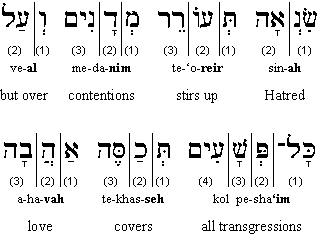|
Of course, not all hatred is bad, since the Scriptures command us to hate evil (Psalm 21:5, 139:21-22, etc.). However, the hatred, aversion, and malice that men habitually express for their fellow man demonstrates the radical depravity of the human condition. May God Himself spare us... Indeed, Yeshua our Messiah taught us to love our enemies and do good to those who hate us, thereby promoting the message of God's "covering love" for a fallen and hurting world (Luke 6:27-35).
To be able to truly love others requires a miracle on the order of splitting the sea or raising the dead, but God has promised to put a new heart (ΧΦ΅Χ ΧΦΈΧΦΈΧ©Χ) and a new spirit (Χ¨ΧΦΌΧΦ· ΧΦ²ΧΦΈΧ©ΧΦΈΧ) within us (see Ezek. 36:26). The world system seeks to enslave and paralyze people through fear, but God's Spirit enables us to overcome the world and its deception by demonstrating love and good will toward others.
Can we go wrong in this approach? After all, by turning a blind eye to the faults of others are we not making ourselves vulnerable to abuse or exploitation? Shouldn't we test other people's heart and their motives? Perhaps we should, though I would rather be found guilty of loving too much - of giving the benefit of the doubt to another - than to be found guilty of withholding love in cautionary prudence.... Practicing the good eye "builds up" the other person by prophetically envisioning their healing and redemption. In this connection, Kierkegaard wrote: "It is always in my power, if I am one who loves, to chose the most lenient explanation. If, then, this more lenient or mitigating explanation explains what others light-mindedly, hastily, harshly, hardheartedly, enviously, maliciously, in short, unlovingly explain summarily as guilt, if the mitigating explanation explains this in another way, it removes now one and now another guilt, and in this way reduces the multitude of sins or hides it." (Works of Love)
|



